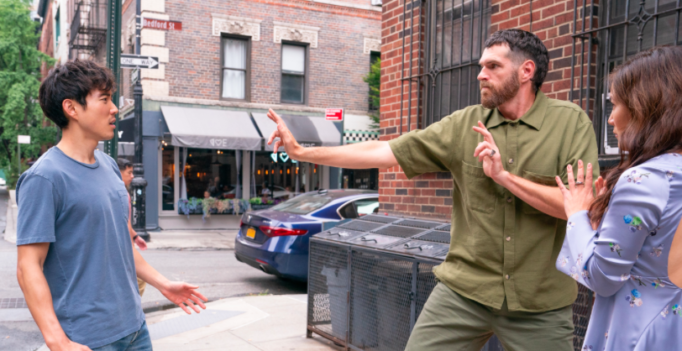By: Jolie Featherstone
Adorable funnyman and prolific Hollywood actor Randall Park (seriously, look at his IMDB page) makes his feature film directorial debut with the much-anticipated Shortcomings, based on the lauded graphic novel series by Adrian Tomine who also adapted the screenplay.
Shortcomings follows cynical, young cinephile, Ben (After Yang breakout Justin H. Min). Ben lives in California with his long-time partner, Miko (Ally Maki). He spends his days working at a local rep cinema, watching movies, and hanging out at diners with his friend, Alice (Sherry Cola). Miko works for a film festival and is moving up in her career, but Ben sneers at the corporate politics and schmoozing Miko has to engage in as part of her job. When Miko heads to New York for a three-month-long internship, Ben is left to his own devices. He begins to explore what he thinks he might want – with his trusty BFF Alice along for good times and guidance.
Shortcomings is a self-aware, adult coming-of-age film masquerading as a romantic dramedy. It evokes the butterfly highs and summertime sadness lows of dating captured in (500) Days of Summer – except Ben isn’t as subtle as Tom is with his hardline expectations and heavy-handed opinions and prescriptions for everyone else around him.
Justin H. Min is committed to portraying Ben in all of his angsty, self-defeating glory. Ben struggles with connecting to people. He has sky-high standards. Whether it be regarding their careers or their taste in film, he has no qualms about being brutally honest with others. Yet Ben also struggles with roving ideologies. He moves the goalposts of his criteria – often to what is convenient for him in the moment. He cherry-picks his position on things and at times contradicts himself. He doesn’t realize it, but he’s still figuring things out and learning about who he is. With Min’s soulful yet sweet brand of handsomeness, he is deceptively excellent at portraying…well…jerks. His performance as Edwin, the smug and secretly competitive pastor, in Netflix’s Beef was a masterclass in restrained toxicity. With Ben, Min gets to continue to play with a character sabotaged by his own self-importance while also allowing the gates to open a bit more and loudly show his character’s maladaptive social habits.
When Ben’s long-time partner leaves for a sought-after internship in New York City in the midst of a rocky time in their relationship, rather than do some soul-searching Ben starts to wonder what it’s like living the “on a break” lifestyle. He embarks on these misadventures with Alice at his side. Alice is an extroverted lesbian grad student who has yet to tell her Christian, Korean family about her sexual identity. Indeed, she brings Ben as her pretend date to a family wedding. Although Alice flies by the seat of her pants socially, she’s an attentive listener and supportive friend to Ben, which sometimes includes calling Ben out on his bluff. The chemistry between Ben and Alice feels wholly effortless and lived-in. Their banter is sharp and they trade quips seamlessly. Some of the most emotionally important scenes in the film happen between Ben and Alice.
One such item that Alice calls out Ben for is his seeming affinity for white women – or, more honestly, his idea of what it would feel like to date a white woman. A dichotomy arises in how Ben poo-poos representation within the context of capitalist media at Miko’s film festival, yet later on he attends a young white woman’s “punk art show” where (surprisingly or perhaps unsurprisingly) her predominantly white art troupe delivers a self-aggrandizing performance piece on immigration. Despite it all, Ben tries to shrug off his concerns.
However, we’re reminded that Ben’s lived experience includes other-ization as an Asian man in America. We learn he was the only Asian-American kid at his heavily-Mormon school. At another point in the film, when a young woman tells to him that he’ll want to blame his problems on his race or any number of reasons other than his own actions, he’ll be wrong. But that’s not entirely fair. While Ben is tough on people and often self-sabotaging, his experiences are more than likely to be impacted in some way by the colonial and white supremacist dominant ideologies of North American society.
Park does a formidable job managing a text that navigates complex subjects such as race and representation. Yet, he keeps the film warm and humourous. Although Ben may shock us with how he responds to certain social situations, we don’t lose hope for him. We hope that he’ll eventually do the right thing. We hope he might ease up and take a more direct look at himself and his role in the ups and downs of his life.
The film is chock-full of glowing gems of cameos, including from Randall Park himself. Jacob Batalon (Peter Parker’s bestie in the recent Spider-Man movies), social media star Scott Seiss (Cocaine Bear), and Tavi Gevinson (TV’s Scream Queens) steal their scenes as insouciant employees at the theater Ben manages. (Note: there’s a great little Easter egg of a joke for any MCU fans watching). Gevinson’s comedic acting in the school of Marilyn Monroe or Judy Holliday – wherein it seems like her character’s not “aware” of the joke – makes her scenes with Min that much more impactful. Her character Autumn’s ‘Gwyneth Paltrow in the Royal Tenenbaums’ look combined with her bohemian-white-girl-in-Cali vibe intrigues Ben.
Timothy Simons (Yes, God, Yes and TV’s VEEP) is hilarious in his role as a character we love to hate. Ally Maki and Life of the Party’s Debby Ryan (as a “frenemy” of Alice’s and potential love interest of Ben’s) bring emotional and intellectual depth to their roles which could have easily been relegated to 2-D characters in the rom-coms of the 1990s. But this is not the 90s and this is not a conventional rom-com. Park and Tomine give these specific characters interesting material to work with, and work with it they do. Both Maki and Ryan bring a humanity to their characters. One of the last lines of dialogue that Maki’s Miko delivers to Ben during a heart-to-heart is so cathartic, there was an audible reaction in the theatre.
Certain editing choices and dialogue direction hint at Park’s newness to the role of directing, but these are minor in the grand scheme of the film. They don’t take away from the story. They only hint that certain elements could have been elevated – perhaps with a bit more experience. There’s also the added layer of complexity working with a screenplay that was adapted by the very same writer of the source text which Park manages gracefully. Tomine’s adaptation felt smooth and thorough, without being clunky.
With Shortcomings, Randall Park brings precision and honesty in reflecting a certain milieu that will resonate deeply with audiences – particularly folks who fall within the Gen X, Millennial, and Gen Z timelines. It has the makings of a cult hit in the vein of the aforementioned (500) Days of Summer, or other crowd-pleasing hits like The F Word and High Fidelity.
**********
Do You Tweet? Follow These Tweeple:
Jolie Featherstone: @TOFilmFiles





Be the first to comment